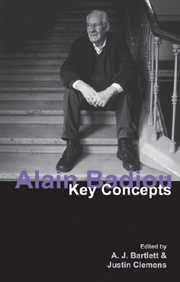Book contents
- Frontmatter
- Contents
- Contributors
- Acknowledgements
- Abbreviations
- Miscellaneous Frontmatter
- Introduction: Badiou's form
- 1 Biography and early works
- PART I THE FOUNDATIONS OF BADIOU'S THOUGHT
- PART II BADIOU'S KEY CONCEPTS OR “CONDITIONS”
- PART III BADIOU'S ENGAGEMENT WITH KEY PHILOSOPHERS
- Afterword: Badiou's futures
- Bibliography
- Index
Afterword: Badiou's futures
- Frontmatter
- Contents
- Contributors
- Acknowledgements
- Abbreviations
- Miscellaneous Frontmatter
- Introduction: Badiou's form
- 1 Biography and early works
- PART I THE FOUNDATIONS OF BADIOU'S THOUGHT
- PART II BADIOU'S KEY CONCEPTS OR “CONDITIONS”
- PART III BADIOU'S ENGAGEMENT WITH KEY PHILOSOPHERS
- Afterword: Badiou's futures
- Bibliography
- Index
Summary
In keeping with the tenor of this collection, we shall conclude by summarizing the aetiology and import of some of Badiou's key concepts in order to ask: where to from here? Above all, we need to reiterate that Badiou is continuing to practise philosophy in “the fullness of its ambition”. For Badiou, this has meant returning to the “origin” of Western philosophy in order to show that: “Plato” exceeds the critiques of “Platonism” that dominated the twentieth century; that this “excessive” Plato offers a mode of thinking that entails an attention to the “conditions” of science, art, love and politics; that this further involves the construction of philosophy against its intimate others, such as “sophistry”; finally, this enables the reconstruction of a Platonism for today, one that runs diagonally to the received divisions in the existing situation (such as the distinction between “analytic” and “continental” philosophy), while maintaining such classical philosophemes as “truth”, “ontology” and the “subject”.
Yet we also have to emphasize that Badiou, as a philosopher, can never be entirely happy with his own philosophy. As we have seen, Badiou's own work has shifted markedly from his early work up to Theory of the Subject, before creating the most significant rupture in his own oeuvre with Being and Event. Since then, he has reaffirmed, refined and extended fundamental aspects of his BE project (including mathematics = ontology, the priority of the conditions), but radically reconfigured others (especially the scope and status of logic and the theory of the subject) – as is evident from Logics of Worlds, the sequel to Being and Event.
- Type
- Chapter
- Information
- Alain BadiouKey Concepts, pp. 185 - 190Publisher: Acumen PublishingPrint publication year: 2010
- 1
- Cited by



